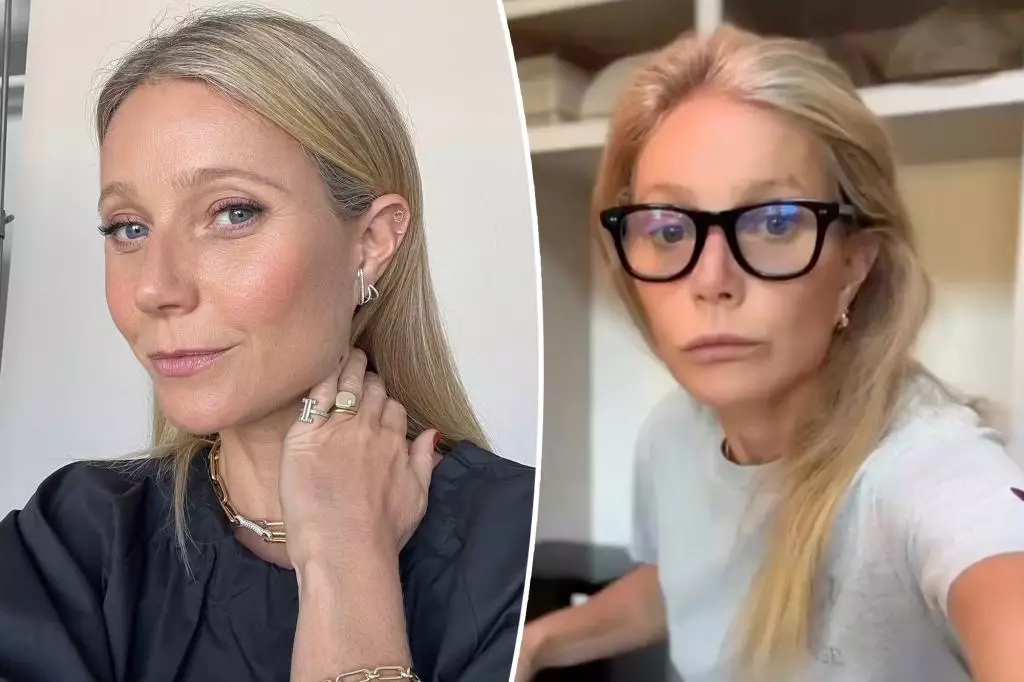In today’s social media-driven landscape, celebrity appearances are scrutinized with relentless intensity, often setting unrealistic standards of beauty for the public. When Gwyneth Paltrow’s recent look sparked curiosity and controversy over her fuller lips, it exposed a broader societal obsession with perfection and the underlying pressure to conform to certain aesthetic ideals. It’s crucial to recognize that beauty is inherently subjective and multifaceted; its societal valuation, however, is often dictated by fleeting trends and the superficial narratives propagated by industries eager for consumer engagement.
While some fans praised her culinary skills, many fixated on her altered appearance, revealing a bizarre disconnect between her talents and her looks. This type of obsession often distracts from appreciating the qualities that make individuals unique, fostering a superficial hierarchy based solely on appearance. Celebrities like Paltrow serve as both reflection and catalysts of these societal dynamics, navigating a landscape where authenticity is often seen as a vulnerability. Her openness about her past use of cosmetic procedures demonstrates a complex tension—she acknowledges the influence of appearance on her public image yet also criticizes the stigma associated with cosmetic work. This ambivalence underscores a societal paradox: the desire to maintain youthfulness versus the societal shame often attached to altering one’s looks.
The Double-Edged Sword of Social Media
Social media acts as a double-edged sword—simultaneously democratizing beauty while amplifying judgment and criticism. When Paltrow’s lips appeared fuller, a chorus of online comments erupted, some laudatory but many cruel or dismissive. It’s evident that these platforms provide minimal space for nuanced conversations, often reducing complex issues of appearance to petty jabs and superficial mockery. The “Marge Simpson lips” joke and comments questioning her honesty highlight how social media fosters a culture of comparison and mockery, where celebrities are expected to remain static and “naturally” perfect.
Yet, amidst this barrage, voices of support also emerge, emphasizing kindness, acceptance, and the importance of focusing on more meaningful qualities. Such reactions remind us that societal critique often stems from unresolved insecurities projected onto public figures. Gwyneth’s case exemplifies how relentless commentary can perpetuate a cycle of superficial scrutiny, entrenching harmful beauty standards that are both exhausting and unrealistic.
The Reality of Cosmetic Procedures and Societal Expectations
Gwyneth’s candidness about her experiences with injectables like Xeomin and Botox shines a light on the increasingly normalized use of cosmetic enhancements among women, especially those in the public eye. Her admission that she’s experimented with such procedures and her critique of the stigma surrounding them challenge the outdated notions that look-perfect celebrities are unapproachable or inherently “fake.” Instead, her transparency calls for a more honest conversation about aging, self-care, and the choices individuals make to feel confident.
Moreover, her past dissatisfaction with Botox reveals the risks of succumbing to societal pressures—usually driven by media portrayals of eternal youth—and highlights the importance of self-acceptance. The obsession with perfect lips or wrinkle-free faces ignores the complex interplay of genetics, lifestyle, and personal choice. Celebrities who choose to share their journey toward aesthetic enhancement force us to confront the uncomfortable truth: that beauty is not solely innate but often a constructed ideal reinforced by industries that capitalize on insecurity.
Challenging the Culture of Judgment and Embracing Authenticity
The reaction to Paltrow’s supposed lips—ranging from ridicule to defense—serves as a microcosm of society’s conflicted attitude toward authenticity. While the internet often celebrates unfiltered honesty, it simultaneously condemns any deviation from perceived natural standards. For some, these aesthetic changes are a betrayal of authenticity; for others, they are a form of self-expression or self-care.
The overarching issue lies in how we judge and categorize beauty, often neglecting the individual behind the image. Gwyneth’s situation encourages viewers to reflect on whether societal expectations are truly valuable or merely superficial hurdles we impose on ourselves and others. The real strength lies in embracing change—whether cosmetic or personal—without succumbing to shame or the desire for external validation.
By scrutinizing celebrity transformations critically, we empower ourselves to challenge ingrained stereotypes, fostering a culture where authenticity is celebrated over conformity. Gwyneth Paltrow’s example prompts us to rethink what it means to look and feel beautiful in an age obsessed with appearances. Authenticity, after all, is not about being perfect but about owning our choices and recognizing the uniqueness that makes us genuinely ourselves.

